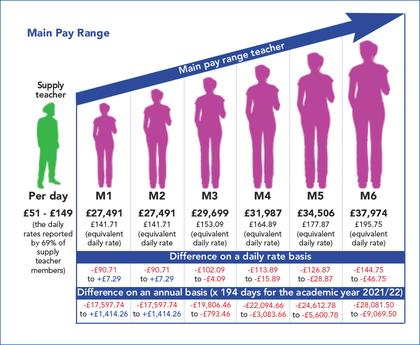Information for Reps in their support of the campaign for supply teachers in Wales to be awarded a 12% pay increase for the 2022/23 academic year.

Supply teachers are committed, dedicated and highly qualified professionals who provide an invaluable resource for schools. Supply teachers make a vital contribution to securing high educational standards for all children and young people.
Campaigning to secure professional entitlements for supply teachers is a key priority of the NASUWT, together with securing decent pay and working conditions for all supply teachers.
The disparity between the pay of supply teachers and other teachers and the precarious financial situation supply teachers have found themselves in have been further exposed during the Covid-19 pandemic, where many supply teachers have been cut adrift and forced to make tough decisions about their expenditure or rely on the increased use of credit or the generosity of family and friends to make ends meet.
Some supply teachers have been forced to claim Universal Credit and there are those who have had to rely on food banks. The increased reliance on agency working for the overwhelming majority led to a reduction in the pay and conditions of service of supply teachers, who often have no choice but to obtain work via different supply agencies, thereby leaving them vulnerable to the vagaries of precarious, intermittent and insecure employment.
In the past, schools engaged supply teachers directly or accessed them from local authority supply pools. Private supply agencies existed at the margins, but not to the extent they do now. The National Institute of Economic and Social Research (NIESR) publication Use of Agency Workers in the Public Sector estimates that the number of employment agencies in education has doubled to 500. [1]
The Association of School and College Leaders (ASCL) confirms that more than 70% of secondary school headteachers have increased their spending on agency supply teachers in the three years to 2018. One of the key factors cited in the ASCL survey for the increased expenditure was increased supply agency fees (54% of respondents). [2] However, whilst fees charged to schools have increased, supply teachers have not benefited and the pay of supply teachers has increasingly lagged behind the salaries of teachers employed by schools.
The Trades Union Congress (TUC) has identified education as one of the sectors having the fastest growth in insecure work, which is reported as having risen by 42% since 2011. [3]
The evidence suggests that in an increasingly fragmented context, privatised supply agencies are exploiting the recruitment and retention challenges in schools for profit.
The average daily pay rate for a classroom teacher employed by a school is £215.79. However, the majority of supply teachers report that they are paid between £100 and £149 per day. The majority of supply teachers have not seen their remuneration increase substantially since 2014.

Rates of pay for supply teachers during the academic year 2020/21 and the Covid-19 pandemic
Despite the introduction of the supply teachers framework, under the National Procurement Service (NPS), promising a minimum salary level of at least M2 for supply teachers undertaking assignments for agencies on the NPS framework, just under a quarter of supply teachers (24%) stated that this was not the case for them.
For those supply teachers who were not paid in line with the arrangements set by the NPS for the academic year 2020/21, just under a third (31%) stated that they were paid between £51 and £119 per day for assignments, just under two fifths (38%) stated that they were paid at between £120 and £149 a day, and over one in ten (12%) stated that they were paid at between £150 and £199 a day for assignments. Only 6% stated that they were paid at over £200 per day for assignments. Over one in ten (13%) stated that they were paid at less than £50 per day for assignments.
The introduction of the framework was supposed to provide a minimum floor level for the pay of supply teachers, but the NASUWT is aware that schools are not legally obliged to pay supply teachers the minimum pay rate, as there is no legislation that can enforce this. In addition, schools are not compelled to use the framework.
Furthermore, the Union has been made aware that some of the agencies on the framework are not complying with the requirement to guarantee supply teachers a daily rate equivalent to M2. Instead, some agencies are providing supply teachers ‘off framework’, at rates below the M2 minimum, or supplying them as cover supervisors at cover supervisor rates, and then the school expects them to teach.
This demonstrates that the increased reliance on agency working has led to a reduction in the pay and conditions of service of supply teachers. Rates of pay of supply teachers have remained stagnant for the overwhelming majority of supply teachers and have been eroded by inflation.
Across the UK, teachers have suffered up to 17% real-terms cuts in pay since 2010. However, in comparison, without the application of the national pay framework, supply teachers have seen their pay plummet relative to other teachers, with no national entitlement to an annual pay award when employed via supply agencies.
If employed for all 194 days of the 2021/22 academic year, well over two fifths of supply teachers (44%) could expect to earn a salary less than or equivalent to £9,894 to £23,086 for the academic year 2021/22. Such rates of pay would currently see a supply teacher earn between £17,598 to £4,405 below the M2 advisory pay spine, as detailed for teachers in Wales for 2021/22.
When looking at the data in regard to comparisons between the journey taken by a supply teacher and a teacher working in school, the discrepancies in pay become even more stark. As referenced earlier, assuming a teacher working on a permanent contract receives an annual pay increment, by the time they reach M6, the difference between the pay of a supply teacher and that of a teacher on a permanent contract could be between £28,081.50 to £9,069.50 per year.

Furthermore, in Wales, a teacher on a permanent contract would be eligible to go through the threshold, enabling them to access higher rates of pay up to and including UPR3. As a consequence, the differences between the pay of a supply teacher and that of a teacher on a permanent contract are further exacerbated, so that the difference could be between £32,440.68 to £13,428.68 per year.

Given the vagaries of insecure, intermittent and precarious work for vast swathes of supply teachers, it is extremely optimistic to think that they will be able to work for all 194 days of the 2021/22 academic year and therefore earn anything near the amounts referenced above. Many supply teachers are therefore earning far less than their permanent counterparts in schools, in spite of their level of experience and expertise.
At the end of the academic year, I was in the position of having to accept a lower rate of pay for a school just over the border or risk not getting any work at all.
If teachers get little respect from students and parents, then supply teachers really are the lowest of the low.
Between the period 2014 to 2021, the value of supply teachers’ pay has decreased between 12.8% and 20.7% than if supply teachers’ salaries had increased to keep pace with both the Consumer Prices Index (CPI) and Retail Prices Index (RPI) rates of inflation since 2014.

Cost-of-living crisis
This situation has been compounded by the cost-of-living crisis and levels of inflation, which is at the highest level for nearly 30 years. Moreover, at the time of writing, RPI inflation has reached 11.1%, the highest level for nearly 40 years (ONS, Consumer Price Inflation, UK: April 2022). The Government expects it to be even higher by autumn 2022.
The rise in inflation will exert pressure on the Bank of England to raise interest rates, increasing the cost of housing for supply teachers alongside increases to the cost of goods and services.
All teachers are in the throes of a cost-of-living crisis, but for supply teachers subject to the vagaries of insecure, intermittent and precarious employment, the situation is even more prescient.
In addition, the impact of the increase in National Insurance Contributions (NICs) of 1.25% in April 2022 needs to be added to the picture of record increases in the price of goods and services up to the date of the NICs increase.
This will mean that most supply teachers’ pay packets from April 2022 are lower than their September 2020 pay packets, despite the enormous increase in the cost of living since then.
Taking the RPI as the inflation measure which most accurately measures increases in prices for supply teachers, it cannot go unnoticed that supply teachers are significantly poorer in real terms than they were in 2010.
Access to the Teachers’ Pension Scheme
The situation for supply teachers as agency workers is compounded by the fact that employment by or through agencies is currently not pensionable under the Teachers’ Pension Scheme (TPS), leaving many supply teachers no alternative than to make less favourable pension plans, including reliance on inferior auto-enrolment pension arrangements. There is a strong argument that supply teachers, working alongside other employed teachers, should be afforded the right to access the TPS.
Access to permanent employment
Transfer/finder’s fees are often imposed by supply agencies when a school seeks to offer a supply teacher a substantive post. Typically, the school pays the agency a percentage of the salary that the supply teacher would have earned had they continued to be employed as an agency worker.
The NASUWT is aware from individual member casework and research evidence that finder’s fees can range from between £5,000 and £10,000. [4] This has the effect of restricting or even removing the right to work for many agency workers, especially for women, Black and disabled workers, who are disproportionately represented as agency workers.
We are also aware of unscrupulous practices adopted by some supply agencies in recruiting onto their lists student/newly qualified teachers with claims that they will assist them to obtain work when they are qualified. These teachers may then find that their ability to secure employment is restricted as a result of being on the list of a supply agency.
The use of finder’s fees in schools should be prohibited.
Alternative arrangements
The Supply Register (TSR) is an organisation established to promote an ethical alternative to supply teacher procurement. TSR guarantees that the pay of supply teachers is calibrated according to national pay and conditions from day one.
All supply teachers working for TSR are paid using pay-as-you-earn (PAYE) and TSR does not support or promote the use of umbrella companies. TSR does not charge any finder’s fees to schools when seeking to employ a supply teacher. There are transparent charges and no hidden fees. TSR operates a simple and straightforward fee-charging system which collects just £12 a day per assignment from a school for each supply teacher that it provides. This contrasts with £50 plus commission charges which agencies add to an assignment.
TSR estimates that supply teachers have received an additional £640,000 based on previous levels of remuneration. In addition, it is estimated that TSR has realised savings of approximately £950,000 to schools, academies and multi-academy trusts (MATs) since 2016 to 1 January 2020.
The situation in the devolved administrations also shows that a better way of working is possible that delivers for both supply teachers and schools.
For example, the Welsh Government’s 2017 two-year pilot school cluster project, which involved the direct employment of newly qualified teachers who worked across clusters of participating schools, showed that cluster schools experienced an improvement in the quality of teaching in comparison with that previously experienced via commercial supply provision. [5]
As the supernumerary teachers were directly employed by a small number of schools, they were able to become familiar with the pupils, the staff, the school policies and procedures. The quality and consistency of pupils’ learning experience improved and the emotional wellbeing of learners was addressed by this more stable learning experience, with positive outcomes in pupil behaviour.
These results suggest that where schools and permanent teaching staff at those schools embed supply teachers in the school community and have a regular, professional, collaborative relationship with a pool of qualified supply teachers, the impact on pupil learning can be positive. This is also supported by wider research into effective pedagogy. [6]
In Northern Ireland, the provision of substitute teachers is overseen by the Northern Ireland Substitute Teacher Register (NISTR), which is operated by the Department of Education (DE). The NISTR was designed specifically to tackle the practical issues involved in arranging suitable teaching cover identified in the Northern Ireland Audit Office report on The Management of Substitution Cover for Teachers (2002). [7]
Substitute teachers are registered through an online booking system which enables schools to book teachers through a regional centralised database. Payment for all approved periods of substitute teaching is then made on a monthly basis at a daily rate through the payroll system run by the DE. The system benefits both schools and teachers as it provides flexibility for the teacher to manage their own availability and travel distances.
The school can access the teachers’ full qualifications, Disclosure and Barring Service (DBS) checks, details of their experience and areas of expertise, and make a booking in real time, at any time. The centralisation of administration provides for greater economies of scale and, given that it gives access to all teachers operating in one area, enables schools to easily identify all the appropriate teachers. It is endorsed by the Government, trade unions and other relevant professional associations.
We believe that these alternative delivery models demonstrate that there is an alternative and viable solution for the employment of supply teachers in England.
Well-managed and maintained banks of directly employed, appropriately remunerated supply teachers, operated by central government, local authorities, a MAT or clusters of schools, have significant advantages for supply teachers, including, but not limited to:
-
access to a proper pay structure;
-
the potential to access pay progression, including threshold applications;
-
access to in-service training;
-
the ability to become familiar with the pupils, the staff and the school, including policies and procedures; and
-
the ability for supply teachers to access the Teachers’ Pension Scheme.
In addition, it should be noted that there are considerable advantages for schools too, including, but not limited to:
-
improved quality of teaching and learning;
-
a more stable learning experience with positive outcomes in the behaviour of children and young people;
-
the ability to embed supply teachers in the school community and have a regular, professional, collaborative relationship with a pool of qualified supply teachers;
-
a dedicated pool of fully qualified supply teachers exclusively available across schools in the area;
-
a maintained list of fully vetted and qualified supply teachers who have been accordingly vetted and quality assured;
-
the management of the service by those, and for those, schools in the area;
-
the ability to eliminate costly transfer/finder’s fees charged to schools by supply agencies;
-
the ability to manage the workforce flexibly and more effectively, including selecting suitably qualified supply teachers, contacting them and engaging them as appropriate;
-
the ability to manage supply costs across a local authority/MAT more efficiently;
-
a more ethical approach to the recruitment and retention of supply teachers that pays supply teachers accordingly;
-
being supported by and accountable to the local authority, MAT or schools in the area;
-
the ability to co-ordinate and deliver on the needs across the local authority, MAT or schools in the area;
-
a local authority or MAT contact for liaising and resolving issues;
-
the ability to provide bespoke online and offline services from daily supply to permanent recruitment, thereby reducing the costs associated with the recruitment and retention of staff;
-
the application of standardised policies and procedures for supply teachers and those employing them;
-
the ability to carry out pay and threshold applications as required;
-
the ability to collect and collate information effectively and efficiently on existing and future supply teachers into a dedicated area;
-
the ability to maintain and extend the database of supply teachers accurately and confidentially; and
-
the ability for supply teachers to access the Teachers’ Pension Scheme.
Implications and recommendations
The evidence suggests that the failure of regulation in the system is leading to a downward spiral of pay and working conditions for supply teachers. The profit-making market for the employment of supply teachers is not working. It does not serve the interests of taxpayers, pupils or teachers and is at odds with public interests, especially in periods of national crisis.
With thousands of supply teachers denied equal pay or the right to work, the NASUWT insists that it is time to end these practices.
The NASUWT welcomes the Welsh Government’s commitment to ‘develop a sustainable model for supply teaching that has fair work at its heart’. In order to make this a reality, we would like to see provision of supply teachers through private profit-seeking agencies replaced with a national publicly owned supply pool, which would provide full conditions of service to all.
The NASUWT therefore advocates for a mechanism to be established that directly employs supply teachers, in order to manage the demand for supply teachers effectively, deliver better value when procuring supply teachers, and secure improvements to supply teachers’ pay and other entitlements at work.
The NASUWT believes that governments and administrations must act to prioritise the following:
-
address the situation faced by supply teachers by recommending that all supply teachers who work in state-funded schools, including agency teachers contracted by schools, are remunerated at rates of pay commensurate with all other teachers, with pay rates that reflect experience in the job;
-
deliver a significant above-RPI inflation increase in salary values over a sustained period to restore supply teachers’ salaries to a level commensurate with other teachers and based on their skills and experience;
-
address issues regarding pay progression for supply teachers by introducing mechanisms to enable them to access higher levels of pay;
-
where agencies continue to operate, limit the level of financial overhead that agencies may charge schools as part of their fee structures;
-
use existing levers to incentivise schools and academies to move towards directly employed or pooled arrangements for sourcing supply teachers; and
-
enable supply teachers to access to the TPS.
Join the campaign
-
You can use our editable templates to email your MP and your MS to lobby them for support
-
If you’re not already a member, join today
-
If your colleagues are not members, ask them to join too - and earn rewards
-
Tag us in your social media tweets and posts to amplify our message:
Footnotes
[1] https://www.niesr.ac.uk/sit es/default/files/publications/NIESR_agency_working_report_final.pdf
[2] https://edexec.co.uk/ascl-survey-reveals-soaring-cost-of-supply-teachers
[3] https://www.tuc.org.uk/sites/default/files/the-gig-is-up.pdf
[4] https://edexec.co.uk/ascl-survey-reveals-soaring-cost-of-supply-teachers
[5] Welsh Government (2019)
[6] Stoll et al. (2012), Great pedagogical development leads to great pedagogy
[7] Northern Ireland Audit Office (2002), The Management of Substitution Cover for Teachers
Your feedback
If you require a response from us, please DO NOT use this form. Please use our Contact Us page instead.
In our continued efforts to improve the website, we evaluate all the feedback you leave here because your insight is invaluable to us, but all your comments are processed anonymously and we are unable to respond to them directly.






